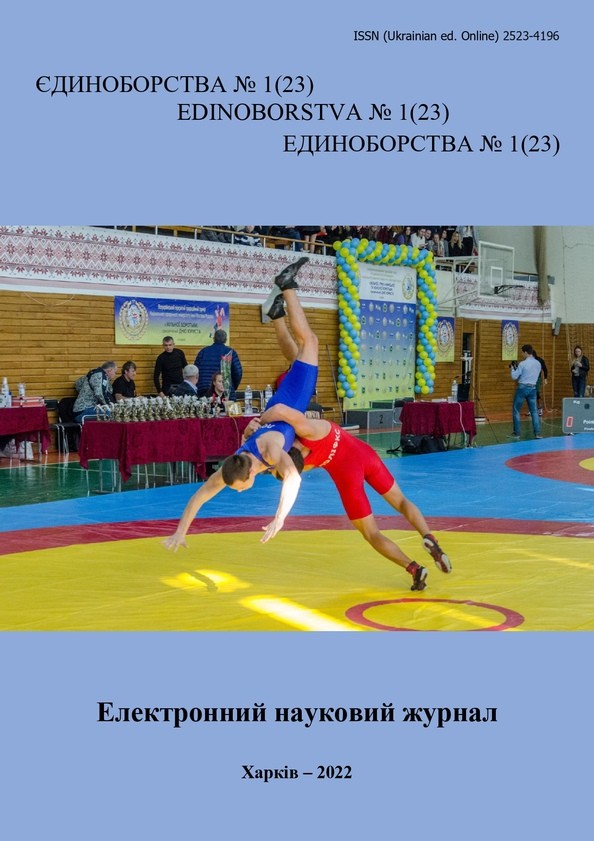Формування психічних властивостей особистості спортсменів, що займаються тхеквондо
DOI:
https://doi.org/10.15391/ed.2022-1.08Ключові слова:
психологія, тхеквондо, психічні властивості, особистість, опитувальникАнотація
Мета: визначити особливості прояву психічних властивостей особистості спортсменів у тхеквондо. Матеріал і методи. У дослідженні брали участь 10 кваліфікованих спортсменів, що спеціалізуються у тхеквондо. Усі учасники є членами збірної України з тхеквондо. Середній вік спортсменів становив 16,7±1,2 року. Дослідження проводились під час тренувальних зборів. Усім було поставлено одне й те саме експериментальне завдання. В експерименті від усіх учасників та їхніх батьків було отримано інформовану згоду. Для оцінки психологічних особливостей спортсменів використовувалися такі методи: теоретичний аналіз та синтез наукової літератури та спеціалізованих сайтів, особистісний опитувальник Г. Айзенка, діагностика комунікативної толерантності В. Бойка, тест «Інвентаризація симптомів стресу» В. Іванченка, методи математичної статистики. Результати: серед тхеквондистів переважають холеричний та флегматичний типи темпераменту. Спортсмени характеризуються середнім рівнем нейротизму та стресостійкості у поєднанні з високим рівнем комунікативної толерантності. Психологічні фактори займають важливе місце в системі підготовки спортсменів, що спеціалізуються в тхеквондо, і пов'язані з розвитком процесів уваги, мислення та сприйняття у поєднанні зі здібностями до просторово-часової орієнтації. Під впливом інтенсивних фізичних навантажень у тхеквондистів формується сильна та врівноважена нервова система, а також яскраво виражені вольові якості. Висновки. Наявність спеціалізованих психічних процесів та якостей дозволяє спортсмену реалізувати свої фізичні та техніко-тактичні можливості, що приводить до високих досягнень у спорті. До них відносяться: точність уявного відображення інформації, що сприймається, почуття часу та відстані, миттєве знаходження потрібних моментів для ударів та захистів, високий рівень концентрації уваги, швидка реакція, добре розвинені розумові процеси, що дозволяють оцінювати бойову обстановку швидко та об'єктивно.
Посилання
Гуніна, Л.М., & Височіна, Н.Л. (2013). Методологія корекції рівня стресу у спортсменів. Achievements of Higher Education, 61–63.
Платонов, В.Н. (2015). Система подготовки спортсменов в Олимпийском спорте. Общая теория и ее практическое применение. [в 2 книгах]. Олимпийская литература, Киев.
Bridge, C.A., Ferreira da Silva, S.J., Chaabène, H., Pieter, W., & Franchini, E. (2014). Physical and physiological profiles of taekwondo athletes. Sports Medicine, 44(6), 713-733. doi: 10.1007/s40279-014-0159-9
Dierdorff, E.C., Bell, S.T., & Belohlav, J.A. (2011). The Power of «We»: Effects of Psychological Collectivism on Team Performance Over Time. Journal of Applied Psychology, 96(2), 247-262. doi.org/10.1037/a0020929 PMid:20919792
Ghorbanzadeh, B., Mundroglu, S., Akalan, C., & Khodadadi, M.R. (2011). Determination of taekwondo national team selection criterions by measuring physical and physiological parameters. Annals of Biological research, 2(6), 184-97.
Iermakov, S., Podrigalo, L., Romanenko, V., Tropin, Y., & Boychenko, N. (2016). Psychophysiological features of sportsmen in impact and throwing martial arts. Journal of Physical Education and Sport, 16(2), 433-441. doi: 10.7752/jpes.2016.02067
Kozina, Z., Sobko, I., Bazulyuk, T., Ryepko, O., Lachno, O., & Ilnitskaya, A. (2015). The applying of the concept of individualization in sport. Journal of Physical Education and Sport, 2, Art 27, 172-177. doi:10.7752/jpes.2015.02027
Lee, C., & Kayvon, А. (2009). Mental Toughness and Athletes' Use of Psychological Strategies. European Journal of Sport Science, 10(1), 43-51. https://doi.org/10.1080/17461390903049972
Ortenburger, D., Wąsik, J., & Bukova, A. (2015). Taekwondo training in the context of dealing with negative emotions. Archives of Budo Science of Martial Arts and Extreme Sports, 11, 99-104.
Pityn, M., Bohuslavska, V., Khimenes, Kh., Neroda, N., & Edeliev, O. (2019). Paradigm of theoretical preparation in sports. Journal of Physical Education and Sport ® (JPES), 19 (Supplement issue 6), Art 338: 2246-2251. doi:10.7752/jpes.2019.s6338.
Podrigalo, L., Cynarski, W. J., Rovnaya, O., Volodchenko, O., Halashko, O., & Volodchenko, J. (2019). Studying of physical development features of elite athletes of combat sports by means of special indexes. Ido Movement for Culture. Journal of Martial Arts Anthropology, 19(1), 51-57. https://doi.org/10.14589/ido.19.1.5
Polianychko, O., Lopatenko, G., Biletska, V., Yasko, L., Spesyvykh, O., & Yeretyk, A. (2018). The psychological influence of open and enclosed spaces on the regulation of motor activity. Journal of Physical Education and Sport, 2, Art 102:703-705. doi:10.7752/jpes.2018.02102
Romoldanova, I., & Vysochina, N. (2021). Features of self-esteem and its influence on the effectiveness of competitive activity of qualified taekwondo athletes. Sport Science and Human Health, 2(6), 169-182. DOI:10.28925/2664-2069.2021.215
Sánchez-López, J., Fernández, T., Silva-Pereyra, J., Antonio, J., & Mesa, M. (2013). Differences between judo, taekwondo and kung-fu athletes in sustained attention and impulse control. Psychology, 4(7), 607. doi: 10.4236/psych.2013.47086
Schack, T. (2012). Measuring mental representations. Measurement in sport and exercise psychology. Handbook of measurement in sport, 203-214.
Solanki, A.S., & Singh, M.K. (2013). Comparative Study of Mental Toughness between the Players of Tae-Kwon-Do and Cricket. Indian Streams Research Journal, 3, 11. doi: 10.9780/22307850,http://oldisrj.lbp.world/UploadedData/3330.pdf
Sotoodeh, M.S., Talebi, R., Hemayattalab, R., & Arabameri, E. (2012). Comparison of selected mental skills between elite and non-elite male and female Taekwondo athletes. World Journal of Sport Sciences, 6(1), 32-8. doi: 10.5829/idosi.wjss.2012.6.1.1107
Vysochina, N.L. (2016). Psychological support in longterm preparation of athletes. Sporto mokslas, 4, 86, 2-9. http://dx.doi.org/10.15823/sm.2016.36
Vysochina, N., & Vorobiova, A. (2017). Goal-setting in sport and the algorithm of its realization. Ştiinţa culturii fizice, 28/2, 108-112. https://ibn.idsi.md/vizualizare_articol/59708
Vysochina, N., Vorobiova, A., Vasylenko, M., & Vysochin, F. (2018). Volitional qualities of athletes and their influence on competitive activities. Journal of Physical Education and Sport, 18(1), 230-234. doi:10.7752/jpes.2018.01030











